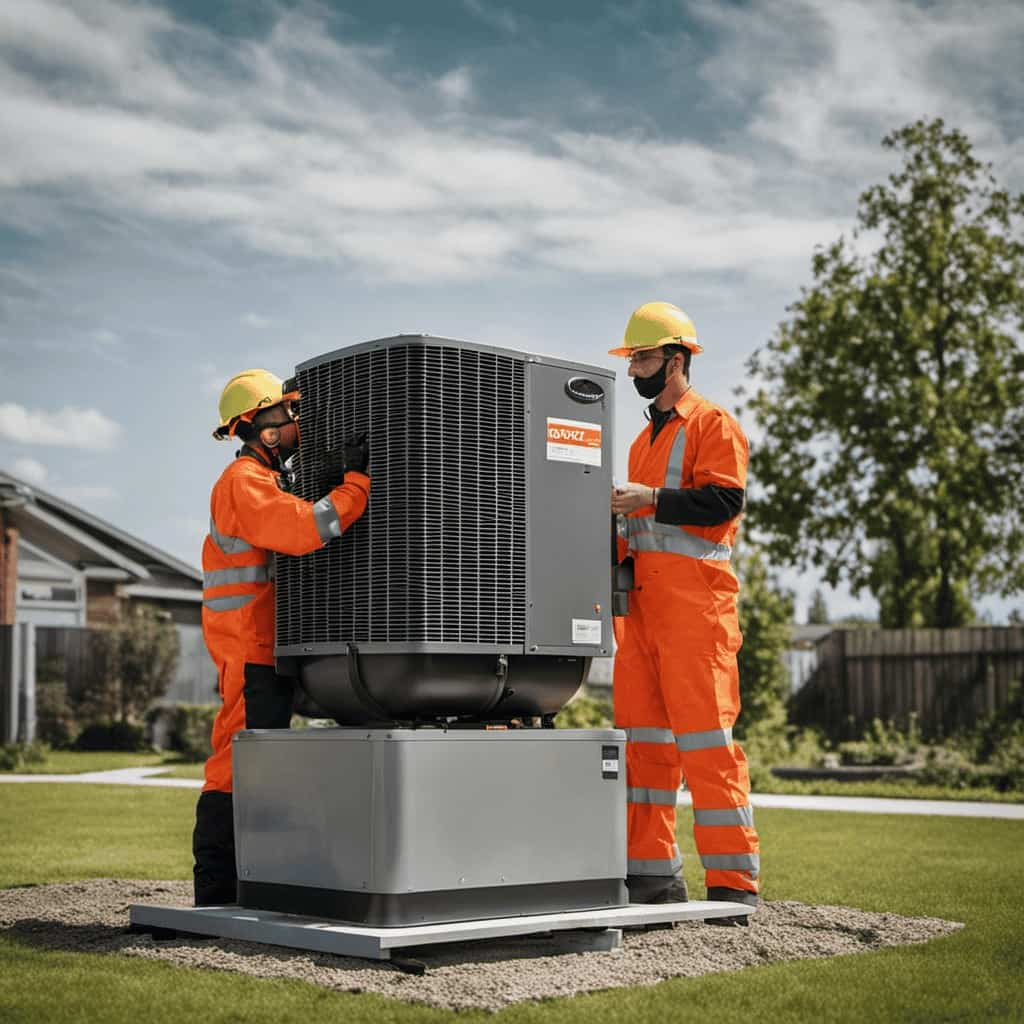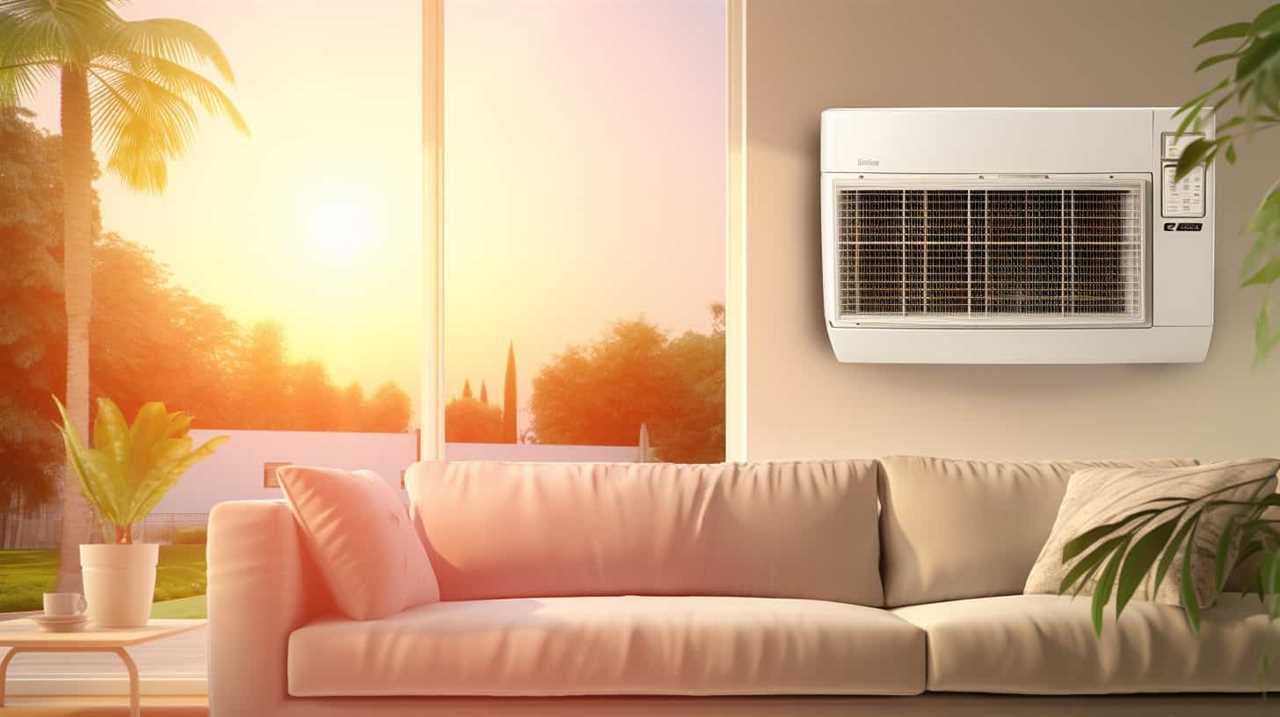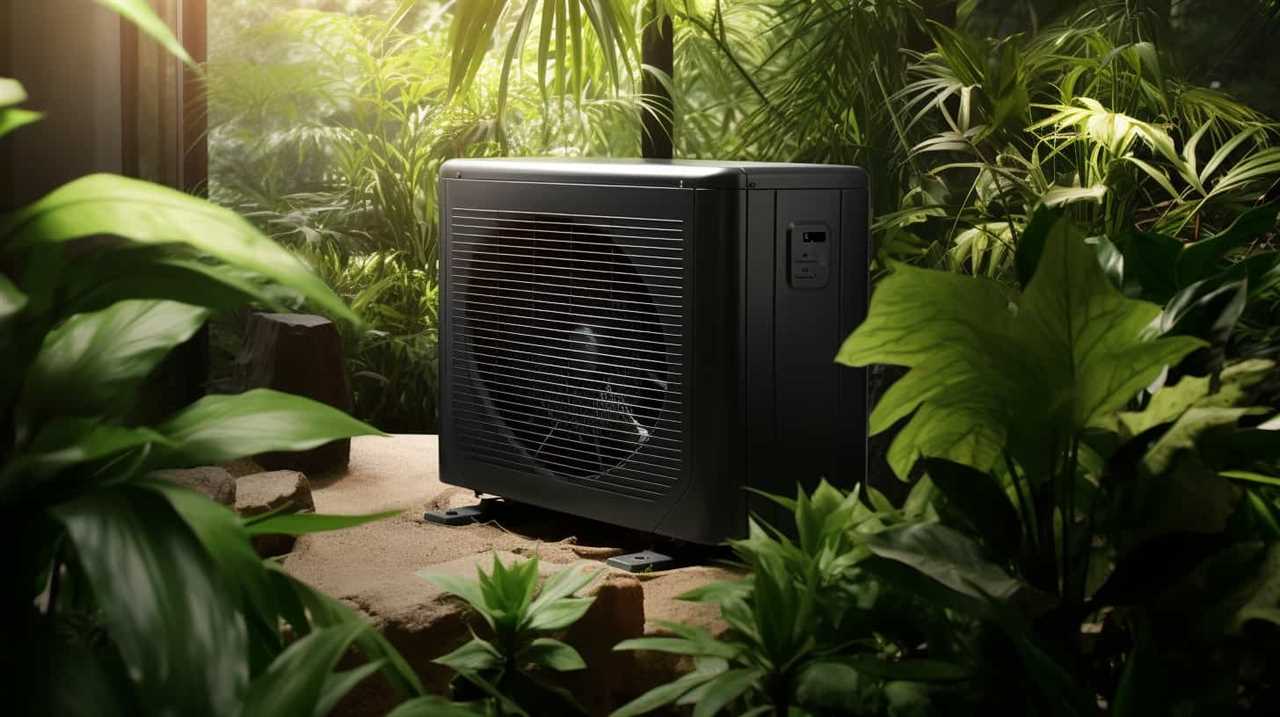We are beginning a quest to uncover the secrets of electricity usage among various heat pumps.
Like intrepid explorers, we will delve into the depths of technical data and analyze the factors that impact energy efficiency.
Comparing various heat pump types, we will equip you with the knowledge to decode their electricity usage.
With this newfound understanding, you can make informed decisions to reduce energy consumption and embrace the freedom of efficient heating and cooling.

Key Takeaways
- Regular maintenance is crucial for optimal energy efficiency and prolonging the lifespan of heat pumps.
- Proper insulation and sealing of ducts minimize heat loss or gain, enhancing energy efficiency.
- Choosing a heat pump suitable for the climate is essential for maximizing efficiency.
- Understanding energy labels and ratings helps consumers make informed decisions about the energy efficiency of heat pumps.
Overview of Heat Pump Energy Efficiency
Let’s examine the energy efficiency of heat pumps in order to gain a better understanding of their electricity consumption.
Heat pump maintenance plays a crucial role in ensuring optimal energy efficiency. Regular maintenance, such as cleaning and replacing filters, ensures that heat pumps operate at their highest efficiency levels. This not only reduces electricity consumption but also prolongs the lifespan of the heat pump.
Additionally, proper insulation and sealing of ducts can further enhance energy efficiency by preventing heat loss.
The benefits of heat pumps are evident when considering their high efficiency ratings. Heat pumps can achieve a coefficient of performance (COP) of up to 4, meaning that for every unit of electricity consumed, they can produce four units of heat. This high COP translates to significant energy savings and reduced electricity bills for consumers.

Factors Affecting Electricity Consumption in Heat Pumps
Our analysis identifies several factors that directly impact the electricity consumption of heat pumps. Understanding these factors is crucial for optimizing the energy efficiency of heat pump systems. Here are three key factors to consider:
-
Heat pump maintenance: Regular maintenance and servicing play a significant role in ensuring the optimal performance of heat pumps. Neglecting maintenance can lead to decreased efficiency and increased electricity consumption. It’s important to clean and replace filters, check refrigerant levels, and inspect the overall condition of the system regularly.
-
Impact of temperature on heat pump efficiency: Heat pumps are affected by ambient temperature. The efficiency of a heat pump decreases as the outdoor temperature drops. This means that in colder climates, heat pumps consume more electricity to meet the heating demands of a building. It’s essential to choose a heat pump system that’s suitable for the climate in which it will be used.
-
Proper insulation and air sealing: The energy efficiency of a heat pump can be significantly impacted by the insulation and air sealing of the building. Well-insulated and properly sealed buildings help to minimize heat loss or gain, reducing the workload on the heat pump and lowering electricity consumption.

Comparing the Energy Efficiency of Different Heat Pump Types
We can compare the energy efficiency of different heat pump types by analyzing their performance and electricity consumption. When evaluating the energy efficiency of heat pumps, it’s important to consider factors such as the coefficient of performance (COP) and the seasonal energy efficiency ratio (SEER).
The COP is a measure of how effectively the heat pump transfers heat from the outside to the inside of a building, while the SEER represents the cooling efficiency during the cooling season. By comparing the COP and SEER of different heat pump types, we can determine which ones are more energy efficient.
Additionally, it’s crucial to consider the maintenance requirements of each heat pump type, as proper maintenance can significantly impact their energy efficiency.
Furthermore, evaluating the environmental impact of heat pumps is essential, as it allows us to determine their overall sustainability.

Tips for Reducing Electricity Usage in Heat Pump Systems
Occasionally, homeowners can reduce electricity usage in heat pump systems by implementing a few simple tips and tricks.
Here are three ways to optimize heat pump performance and debunk common misconceptions about heat pump electricity usage:
-
Set the thermostat correctly: Many homeowners mistakenly believe that cranking up the heat or cooling will make their homes reach the desired temperature faster. However, this only leads to increased energy consumption. Set the thermostat to a comfortable temperature and leave it there to avoid unnecessary energy usage.
-
Regular maintenance: Proper maintenance is crucial for optimal heat pump performance. Clean or replace air filters regularly to ensure efficient airflow and minimize energy consumption. Additionally, schedule annual maintenance checks by a professional to identify and address any issues that could impact energy efficiency.

-
Insulate your home: Insufficient insulation can result in heat loss during winter and heat gain during summer. By properly insulating your home, you can reduce the workload on your heat pump system and decrease energy usage.
Understanding Energy Labels and Ratings for Heat Pumps
To gain a better understanding of the energy efficiency of heat pumps, it’s important to familiarize ourselves with energy labels and ratings. Energy efficiency standards play a crucial role in helping consumers make informed decisions about their energy usage. These standards are set by regulatory bodies and establish minimum performance requirements for heat pumps.
Energy labels provide valuable information about the efficiency of a heat pump, allowing consumers to compare different models and choose the one that best suits their needs. When interpreting energy labels, it’s essential to pay attention to the energy efficiency rating, which is usually displayed as a numerical value or a letter grade. Higher ratings indicate better energy efficiency, meaning the heat pump consumes less electricity to provide the same heating or cooling output.
Understanding energy labels and ratings empowers consumers to make energy-efficient choices and reduce their environmental impact.

Frequently Asked Questions
Can a Heat Pump Be Used as the Sole Source of Heating and Cooling in a Home?
Yes, a heat pump can serve as the sole source of heating and cooling in a home. This option offers high heat pump efficiency and numerous benefits, making it an effective and energy-saving solution for homeowners.
How Do Heat Pumps Compare to Traditional Heating and Cooling Systems in Terms of Electricity Consumption?
Heat pump efficiency and its impact on electricity bills are key considerations when comparing them to traditional heating and cooling systems. We will analyze data to provide a technical and analytical perspective.
What Are Some Common Maintenance Tasks for Heat Pumps to Ensure Optimal Energy Efficiency?
Some common maintenance tasks for heat pumps to ensure optimal energy efficiency include cleaning or replacing air filters, checking and adjusting refrigerant levels, inspecting and cleaning coils, and ensuring proper airflow.
Are There Any Government Incentives or Rebates Available for Installing Energy-Efficient Heat Pumps?
There are several government programs and financial incentives available for installing energy-efficient heat pumps. One interesting statistic is that these incentives can cover up to 30% of the installation cost.

Can a Heat Pump Be Used in Conjunction With Solar Panels to Further Reduce Electricity Consumption?
Yes, integrating a heat pump with solar panels can significantly reduce electricity consumption. This combination harnesses renewable energy, minimizing environmental impact. Decoding the data reveals a promising solution for energy-efficient and sustainable heating and cooling systems.
Conclusion
In conclusion, understanding the electricity consumption of various heat pumps is crucial for making informed decisions about energy efficiency. By comparing the energy efficiency of different heat pump types and implementing tips for reducing electricity usage, homeowners and businesses can optimize their energy consumption.
Additionally, understanding energy labels and ratings provides a valuable tool for selecting the most efficient heat pump system. As they say, knowledge is power when it comes to decoding the electricity consumption of heat pumps.









